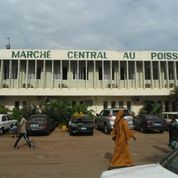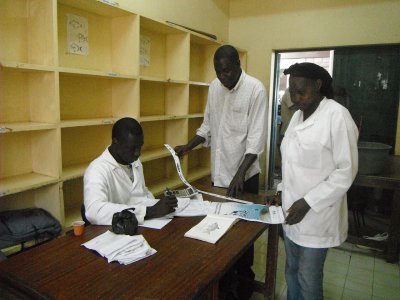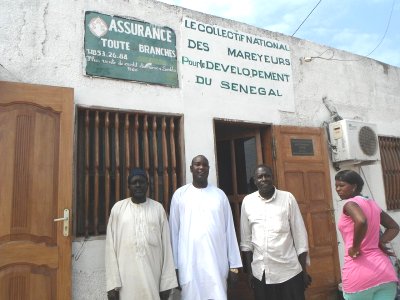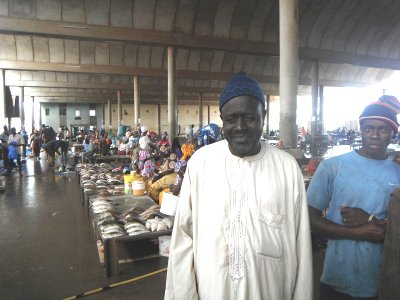di Aliou Sall
Il pesce va dove la gente lo può pagare. Le persone benestanti di Dakar apprezzano il pesce appena sbarcato nei mercati urbani del centro storico. Il mercato Kermel è un mercato storico (fu aperto nel 1860) dove pesce, frutta e verdura sono i principali prodotti freschi in vendita. Riportato al suo antico splendore nel 1997, il mercato attira molti clienti locali e internazionali. I venditori di pesce hanno ricevuto la visita di Mundus maris nel settembre 2012 per aiutarli a prendere buone decisioni di acquisto per i loro clienti e per sé stessi: l’idea era di verificare se il pesce in vendita fosse di taglia adulta. Evitare la vendita di novellame aiuta a sostenere l’attività a lungo termine. Le misurazioni sono state effettuate con l’aiuto del righello per pesci sviluppato durante le attività pilota FAO-EAF Nansen per insegnare l’approccio ecosistemico alla pesca. Proteggere i piccoli pesci e prelevare solo esemplari cresciuti, che si sono giò riprodotti, renderà l’intera catena del valore più sostenibile, dai clienti ai pescatori.
Per due anni Mundus maris ha portato avanti un progetto in collaborazione con alcune comunità pilota di pescatori in Senegal. Gli obiettivi e i risultati raggiunti dal progetto possono essere valutati come risultato delle attività intraprese nell’ambito del progetto Mare Nostrum. Le azioni verso i pescatori quindi non sono iniziate solo oggi, con progetti e altre attività in corso nelle seguenti comunità: Kayar, Hann, Yoff e Guet Ndar a St. Louis.

La campagna di sensibilizzazione per promuovere il rispetto delle taglie minime del pesce del settembre 2012 ha una sua specificità: l’impegno è rivolto alla categoria dei grossisti e in particolare a quelli che operano in uno spazio ben preciso: le pescherie attive nei mercati urbani della capitale Dakar.
Quali sono le sfide rappresentate dall’affrontare questa categoria di persone in questo specifico ambito, e qual è l’interesse ad intervenire a questo livello? Quale strategia viene adottata? Quali sono i risultati raggiunti e quali le prospettive future per i leader delle associazioni di categoria incontrati sul posto?
Le principali ragioni per cui Mundus maris ha scelto di condurre un programma di sensibilizzazione sulle buone pratiche che garantiscano la sostenibilità della pesca specifico per questi attori sono le seguenti: in primo luogo, un mercato come Kermel a Dakar, a causa della sua distanza dai luoghi di sbarco del pesce, non crea automaticamente l’opportunità per i grossisti di essere al corrente dei diversi programmi in corso legati alla crisi delle risorse.
Di conseguenza, visto il modo in cui normalmente lavorano, non hanno familiarità con il concetto e la realtà dello sviluppo sostenibile: si limitano a dedicare il tempo minimo necessario all’acquisto dei prodotti dai porti di pesca e trascorrono gran parte della giornata a commercializzarne i prodotti. Ecco perché Mundus maris ha allargato la sua formazione e sensibilizzazione verso a attori che lavorano nel centro della città.
In secondo luogo, vista l’importanza del coinvolgimento dei consumatori in campagne di sensibilizzazione a favore delle buone pratiche di sviluppo sostenibile, il Mercato Kermel è il luogo d’elezione delle classi ricche e medie della capitale senegalese (che siano senegalesi o di ogni nazionalità residenti nella capitale). Il discreto stato di sicurezza e igiene alimentare, grazie alla buona manutenzione rispetto ad altri mercati più di massa, fa infatti di Kermel il punto d’incontro di una classe di consumatori colti, tra cui il Corpo Diplomatico in Senegal. Questa categoria di consumatori è in linea di principio più ricettiva ai messaggi sulle pratiche che promuovano lo sviluppo sostenibile rispetto ad altri tipi di consumatori ordinari, spesso animati da un certo fatalismo riguardo al crescente degrado delle risorse.

Per raggiungere questi pescivendoli, il coordinamento locale di Mundus maris si è recato al mercato dopo un incontro con Kellé Seck, leader di uno dei gruppi di pescivendoli del mercato Kermel, in un’altra occasione non legata alla pesca. Durante questo primo contatto, abbiamo presentato Mundus maris, ma anche gli strumenti che potrebbero interessare direttamente i grossisti: il righello per pesci, il poster con lattine di soda per la misurazione dei pesci e il poster sull’ecosistema senegambiano, inizialmente sviluppato nel contesto delle attività pilota del Progetto EAF Nansen della FAO per l’introduzione dell’approccio ecosistemico alla pesca.
In seguito a questo primo incontro, i pescivendoli ci hanno invitato a tornare per spiegare il cartellone, aiutarli a interpretarlo correttamente, ma anche a fare con loro prove di misurazione del pesce. Abbiamo trascorso sul mercato ben quattro ore consecutive per la giornata dimostrativa e informativa.
Riguarda ai risultati e alle prospettive, possiamo dire che l’esperimento ha avuto successo ed è molto incoraggiante. La cosa più sorprendente è il fatto che le misurazioni hanno dimostrato che molte specie di pesci vengono consumate al di sotto delle dimensioni minime indicate sul righello. Di conseguenza, i pescivendoli hanno espresso un’unica domanda: come ottenere i righelli per pesce. Ma hanno apprezzato anche la misurazione con le lattine di soda.

A riprova, un gruppo si è offerto volontario per svolgere il proprio ruolo di opinion leader nel mercato. È guidato da Kellé Seck. Inoltre, per raggiungere anche i consumatori, prima di partire abbiamo lasciato dei manifesti da attaccare ai muri.
In futuro il gruppo di grossisti vorrebbe che organizzassimo con loro un’intera giornata di sensibilizzazione, non appena pronti, in collaborazione con i dipartimenti competenti: Dipartimento della Pesca, Comune di Dakar e altri.
Il mare ci nutre
- Win Big – Baltic Event
- World Food Day 2024, Joint Webinar with Fish Party
- Relatore Speciale delle Nazioni Unite sul diritto al cibo
- EP Hearing on EU Citizen Initiative to stop shark finning
- Keynote at the ‘Feed the Future – Innovation Lab for Fish’
- FAO webinar ‘Pesce piccolo a basso prezzo: dall’esca al piatto’, 15-16/02/2021
- Pesce e frutti di mare deliziosi e sostenibili ai workshop di Mundus maris
- Chiloé, ossia: il disastro di Salmonopoli
- Seafood Symposium – Dalla pesca ai buongustai, 27 Aprile 2015
- Baltic students concerned about sustainable foods, Rogow, Poland, 15-19 April 2015
- Dai piatti al carburante – il controverso boom delle alghe in Cile
- Khazan – Traditional coastal zone management in Goa, India
- Comportamento del consumatori attento all’ambiente nel settore alimentare: cosa posso fare?
- Save baby fish or Point ‘n’ kill?
- “Inseparable” – La campagna sulla sostenibilità del pesce celebra un evento ad Atene
- Respect for minimum fish size. What do Senegalese fish mongers have to say?
- La campagna di Mundus maris nei mercati di Dakar
- Salviamo gli Oceani! – Cercle Europa esorta
- International Study Group Brussels: Save the Seas!
- Mercado San Miguel in Central Madrid




